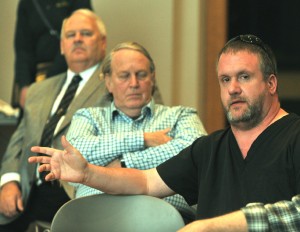
Brett Anderson of Southwick asks a question of Mass Wildlife officials about efforts to protect a wildlife habitat in the town at a meeting Wednesday night in Southwick Town Hall. (Photo by Carl E. Hartdegen)
SOUTHWICK – ATV riders in town have been warned – use of off-road vehicles on the former tobacco fields in town which are now a protected grasslands habitat will no longer be tolerated.
Officials from the Massachusetts Division of Fisheries and Wildlife (also known as Mass Wildlife) visited the town Wednesday night and staged a meeting attended by about 30 residents to explain how they are managing their 254-acre Southwick Wildlife Management Area, a property they purchased in 2008 from the General Cigar Company which is east of the Congamond Lakes on the Connecticut border and abutting a similar property which is owned and managed by a similar agency in that state.
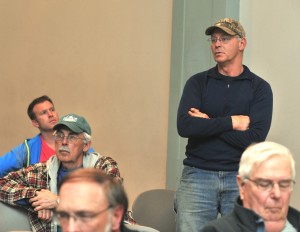
Gary Yelin of Southwick, who along with Mike Grondahl and Travis Loucks spoke Monday at Town Hall as part of the promotional team for Motocross 338, asks for “leniency” toward youthful ATV riders who violate the law by riding their machines on property owned by Mass Wildlife and used as a protected grasslands wildlife habitat. (Photo by Carl E. Hartdegen)
Massachusetts ornithologist Andrew Vitz made a presentation about the birds that live on the Commonwealth’s dwindling grasslands which explained how and why their populations are shrinking.
“We’re trying to provide habitats for these species so we don’t have to list them” as endangered species, Vitz said.
The division’s deputy director, Robert Deblinger, was on hand and said that not only does the use of motorized vehicles impact the birds and wildlife on the property, it also leads to significant erosion problems of their habitats.
He said that not all the users are aware that their activities are illegal.
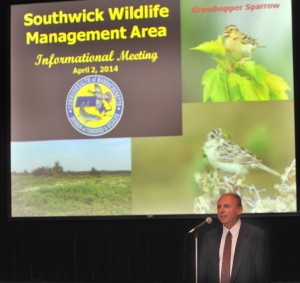
Robert Deblinger, deputy director of the Massachusetts Division of Fisheries and Wildlife, speaks Wednesday night at a meeting in Town Hall to explain increased enforcement efforts targeting ATV users on protected wildlife habitats. (Photo by Carl E. Hartdegen)
“Some people are doing this, they don’t even know its illegal, others they do and so getting the word out that it is illegal and the fines are hefty is important,” he said. “That’s what we’re hoping to get across tonight.”
Deblinger and Ralph Taylor, the supervisor of the division’s Connecticut River Valley properties, explained that the enforcement activities on their property would be aggressive.
Taylor showed an example of the signs that have been posted in the wildlife management area and said “we’ve lost a couple of the signs but we will post them again.”
He also revealed that a number of web access cameras have been installed to monitor the property and he displayed video from one of the cameras which showed two persons using a chain saw to remove large logs that had been placed to block one of the trails used by ATV riders.
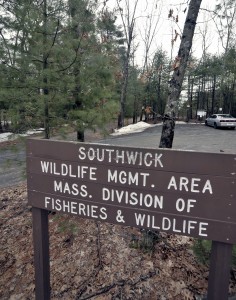
Town and state officials have expressed concern over the wildlife and vegetation damage caused by off-road motorized vehicles. The area has multiple signage locations which clearly state no motorized vehicles are allowed in the protected area. (Photo by Frederick Gore)
He said that type of activity “really steps up the problem because this would really be considered destruction of government property so it brings the level of fines to a much higher level.”
He said “it only took them about two days to come in and take out the blockage areas” but said that the efforts will continue and will include active patrols by environmental police.
Both he and Eblinger both pointed out that recent changes in the laws protecting wildlife area have made the penalties much stiffer.
Taylor pointed out that by law all ATV riders have always had to have written permission to ride on any other person’s property and pointed out that, since most of the ATVs used on the wildlife property are unregistered, “they could be confiscated or they could be taken by police.”
One member of the audience, Brett Anderson, said “they’re not afraid of the cameras” and asked if enforcement officials will use ATV’s for enforcement.
“I think that they would be a little more wary if they knew that occasionally somebody is going to chase them,” he said.
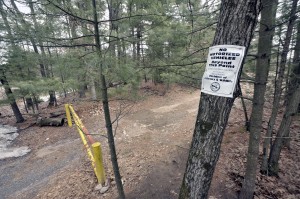
A large steel gate and sign identify the wildlife property as protected land and forbid the use of motorized vehicles.The property is under control of the Massachusetts Division of Fisheries and Wildlife. (Photo by Frederick Gore)
Lt. Michael Scibelli of the Massachusetts Environmental Police responded and said that his agency tries to make patrols, both by individual officers and with teams of ATV equipped officers, at least every couple of weeks.
He said “it becomes very difficult to make a safe stop when you’re dealing with ATVs”, some of which are operated by professional riders, but said that methods have been developed and said “we’ve had some success in addressing the violators.” On some occasions, he said, “we have written well over $1,000 in fines.”
He said that, due to social media, “information gets out very quickly that we’re in there, within minutes” and officers find no problems. Scibelli said that the situation probably changes as soon as the officers leave.
Anderson also pointed out that, particularly in the parking area, the property is also used by persons to dump refuse and suggested a camera be placed there “because those people I would really like to see caught. That’s just a gutless nasty thing to do.”
Deblinger noted that illegal dumping is a huge problem at all of the division’s properties and promised aggressive enforcement when residents report any evidence to Taylor or police agencies.
He also said that “a lot of that activity comes from Connecticut” and said that although the Connecticut agencies “are as limited for manpower as we are” they are going to work in concert with the Mass Wildlife effort this summer.
One resident, Gary Yelin, who along with Mike Grondahl and Travis Loucks spoke Monday at Town Hall as part of the promotional team for Motocross 338, said “90 percent of the riders are youths and they’re not criminals. They’re good kids. This is their form of outdoor recreation” and said that they have historically used the area to ride their machines.
“I think there should be some leniency, you know, towards them,” he said. “Even though it’s wrong, they’ve gone out there for so long and there’s worse things they could be doing with their time.”
But Deblinger was having none of it.
“The point is they are criminals,” he said. “It’s illegal and we are cracking down on it and it won’t be tolerated and they will be prosecuted to the fullest extent of the law. That’s why we’re here tonight. So I’m here to tell you, you may think it’s a wonderful activity and there should be leniency but there will not be any leniency on Mass Wildlife lands.”
“If the dirt bike kids want to get together and organize and purchase land, that’s great,” he said. “Let ‘em buy their own land, but they’re not going to do the activity on Mass Wildlife land. That’s the whole point. That land is for wildlife and wildlife habitat, not for dirt bikes.”
He pointed out that there is a professional dirt bike track just a few miles away.
“Why don’t they train there instead of illegally using Mass Wildlife land?” he asked before answering his own question. “Simple answer. It’s free, on Mass Wildlife land, and it costs money over there.”
“The point is we can’t tolerate it anymore and we’re going to crack down on it,” he said.
Although several persons present noted that there is no place to legally use ATVs, the Mass Wildlife officials insisted that the answer is not to use the land which was purchased to protect wildlife suffering from shrinking habitats.

